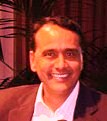Date: Wednesday , February 05, 2014
Have you ever wondered what makes Silicon Valley tick? So many countries around the world have tried to replicate it but there is no other place like Silicon Valley that has made such an enormous impact in the society and our day to day lives. Many books have been written about the entrepreneurial and innovative ecosystem that exists here between angel investors, venture capital, risk-taking entrepreneurs, law firms and immigrants who are hungry and ready to make a mark.
This month\'s article brings to you a highly generous entrepreneur who incorporates most of the pieces that make up the Silicon Valley puzzle. This is how Mike Cassidy characterized him in a San Jose Mercury News article last year. Vish Mishra is a technology entrepreneur-turned-executive and now a VC for past 12 years with Clearstone Venture Partners � a VC fund with nearly $700 Million in committed capital. Clearstone has been quite successful as an early stage investor in PayPal (eBay), Overture (Yahoo!), Kazeon (EMC), Integrien (VMware), Ankeena (Juniper), The Rubicon Project, BillDesk (India), United Online, and Vast. A Silicon Valley veteran, Vish has over thirty years of leadership and management experience including CEO and Director of several companies. He was co-founder of Excelan (1983) acquired by Novell for $225 million; a founder and board member of Telera, a voice web infrastructure company sold to Alcatel for $140 million. A past president of TiE Silicon Valley, he has actively dedicated himself to its growth since its inception. I have the distinct pleasure of knowing Vish for many years including during the time we served together on TiE Board. It is with special gratitude to him, here are four key take away (4KTA) points, which center around the concept of four dimensions of entrepreneurship, based on my discussions with him recently.
1. Know Thyself!
If you want to start a company, you must know what you are truly good at. You must feel comfortable under your skin. For instance, are you a technologist or are you a marketing expert? It helps others to collaborate and work with you. People do not change. Your personality is developed during your teenage years. The rest of your life goes towards learning survival mechanisms. I realized early on that I enjoyed helping others whether it was helping my classmates with their homework or whether giving my colleagues new contacts or advice. In my first job at Control Data, I started as a design engineer in the communications division for re-designing recently introduced product in the market, so I could extract efficiency and reduce cost further. The hardest problem in my job was to get a solid grasp of the customer�s reported problems. So, I started holding meetings with members from marketing, sales, and customer support and product groups to get to the heart of problems amidst hide-bound personalities. As a result of my collaborative and helping nature like a peacemaker, I was moved into management and leadership role early on in my career.
2. Know Your Market
Who is your customer? Is your customer going to buy your product? Do you understand your customer\'s problems well enough that you can build a solution around it? Can you bring the product to market in a timely manner and get instant customer feedback? Make sure you have the pertinent domain expertise in this area to build the best product. Just because social media is a hot trend does not mean you start a company in that area, when, in fact, your expertise is in semiconductors. For example, recently in Ankeena Networks - a portfolio company, two of the co-founders Rajan Raghavan and Prabakar Sundarrajan, came up with an innovative idea for video caching. Before they got started, they talked to over 30 customers to validate the idea and fine tune it to what the precise need was. The company was successfully acquired within 18 months by Juniper Networks. In a healthcare software startup, Quantros, the entrepreneur - a medical doctor wanted to take on the whole healthcare market of payers, providers and drug manufacturers. After entering all three markets, he decided to focus on providers only with a patient safety and risk management solution. With this focus the company became a market leader and was successfully acquired by a private equity firm.
3. Build The Right Product
Entrepreneurs should build a point product rather than a platform. It�s way hard for a startup to sell a platform solution. In the eco-system of your expertise, find one thing that is really broken and develop a solution to fix that. Make sure that it fits into the existing ecosystem and solves one particular customer pain point. For instance, Telera started with an idea to make 1-800 numbers appear as local numbers. It could potentially provide huge savings in long distance calling costs to businesses. Now, in order to make it a reality, we had to build a dedicated network operations center (NOC) to act as a neutral party among various carriers. To accomplish this, we ended up building whole voice over IP infrastructure management software, which became a valuable piece of intellectual property that led to company�s acquisition eventually by Alcatel.
4. Generate Profit
You must focus on generating profit as soon as possible otherwise stay away from becoming an entrepreneur. Every business has to make a profit in order to sustain itself. Profit orientation means recognizing that the business comes first. The cost of goods always needs to be less than the sale price. Hire the right people with the similar mindset. Act fast enough to replace the wrong people.
In summary, the four key take away points for entrepreneur\'s are knowing thyself, knowing your market, building the right product and generating profit.
Naveen Bisht is Co-Founder of Auriss Technologies, Inc, a serial entrepreneur and Board Member, Chair- Programs, The Indus Entrepreneur(TiE), based in Silicon Valley, California. Follow Naveen on twitter @Naveen_4KTA

 RSS Feed
RSS Feed
